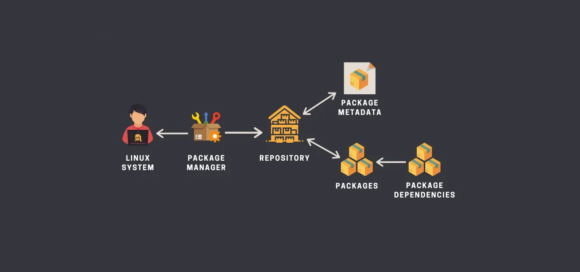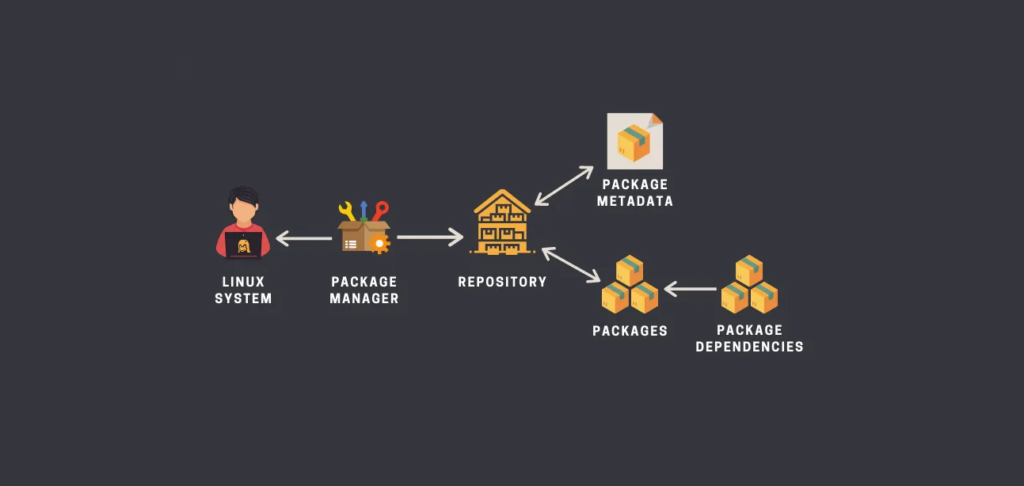
List of software package management systems
List of software package management systems

- APT- Advanced Package Tool, or APT, is a free-software user interface that works with core libraries to handle the installation and removal of software on Debian, Ubuntu, and related Linux distributions.
- RPM Package Manager – RPM Package Manager is a free and open-source package management system. The name RPM refers to .rpm file format and the package manager program itself. RPM was intended primarily for Linux distributions; the file format is the baseline package format of the Linux Standard Base.
- dpkg – dpkg is the software at the base of the package management system in the free operating system Debian and its numerous derivatives. dpkg is used to install, remove, and provide information about .deb packages. dpkg itself is a low-level tool.
- yum – The Yellowdog Updater, Modified is a free and open-source command-line package-management utility for computers running the Linux operating system using the RPM Package Manager. Though YUM has a command-line interface, several other tools provide graphical user interfaces to YUM functionality.
- DNF -DNF or Dandified YUM is the next-generation version of the Yellowdog Updater, Modified, a package manager for .rpm-based distributions. DNF was introduced in Fedora 18 in 2013, it has been the default package manager since Fedora 22 in 2015 and Red Hat Enterprise Linux 8.
- aptitude – aptitude is a front-end to APT, the Debian package manager. It displays a list of software packages and allows the user to interactively pick packages to install or remove. It has an especially powerful search system utilizing flexible search patterns.
- packman – pacman is a utility which manages software packages in Linux. It uses simple compressed files as a package format, and maintains a text-based package database (more of a hierarchy), just in case some hand tweaking is necessary. pacman does not strive to “do everything.” It will add, remove and upgrade packages in the system, and it will allow you to query the package database for installed packages, files and owners. It also attempts to handle dependencies automatically and can download packages from a remote server.
- ZYpp – ZYpp is a package manager engine that powers Linux applications like YaST, Zypper and the implementation of PackageKit for openSUSE and SUSE Linux Enterprise. Unlike some more basic package managers, it provides a satisfiability solver to compute package dependencies.
- Synaptic – Synaptic is a GTK-based graphical user interface for the APT package manager used by the Debian Linux distribution and its derivatives. Synaptic is usually used on systems based on deb packages but can also be used on systems based on RPM packages.
- Snappy – Snap is a software packaging and deployment system developed by Canonical for operating systems that use the Linux kernel.
- Portage – Portage is a package management system originally created for and used by Gentoo Linux and also by Chrome OS, Calculate, Sabayon, and Funtoo Linux among others. Portage is based on the concept of ports collections.
- pip – pip is a package-management system written in Python used to install and manage software packages. It connects to an online repository of public packages, called the Python Package Index. pip can also be configured to connect to other package repositories, provided that they comply to Python Enhancement Proposal 503.
- urpmi – urpmi is a package management tool for installing, removing, updating and querying software packages of local or remote media. It wraps around the RPM Package Manager in the role of a smart package manager.
- Ubuntu Software Center – Ubuntu Software Center, or simply Software Center, is a discontinued high-level graphical front end for the APT/dpkg package management system. It is free software written in Python, PyGTK/PyGObject based on GTK.
- Homebrew – Homebrew is a free and open-source software package management system that simplifies the installation of software on Apple’s operating system macOS as well as Linux. The name is intended to suggest the idea of building software on the Mac depending on the user’s taste.
- APT-RPM – APT-RPM is a version of the Advanced Packaging Tool modified to work with the RPM Package Manager. It was originally ported to RPM by Alfredo Kojima and then further developed and improved by Gustavo Niemeyer, both working for the Conectiva Linux distribution at the time.
- npm – npm is a package manager for the JavaScript programming language. npm, Inc. is a subsidiary of GitHub, that provides hosting for software development and version control with the usage of Git. npm is the default package manager for the JavaScript runtime environment Node.js.
- PackageKit – PackageKit is a free and open-source suite of software applications designed to provide a consistent and high-level front end for a number of different package management systems.
- Nix package manager – Nix is a cross-platform package manager that utilizes a purely functional deployment model where software is installed into unique directories generated through cryptographic hashes. It is also the name of the tool’s programming language.
- slackpkg – slackpkg is a software tool for installing or upgrading packages automatically through a network or over the Internet for Slackware. slackpkg was included in the main tree in Slackware 12.2 – previously it had been included in extras/ since Slackware 9.1. It is licensed under the GNU General Public License.
- RubyGems – RubyGems is a package manager for the Ruby programming language that provides a standard format for distributing Ruby programs and libraries, a tool designed to easily manage the installation of gems, and a server for distributing them.
- pkgsrc – pkgsrc is a package management system for Unix-like operating systems. It was forked from the FreeBSD ports collection in 1997 as the primary package management system for NetBSD. Since then it has evolved independently; in 1999, support for Solaris was added, followed by support for other operating systems.
- slapt-get – slapt-get is an APT-like package management system for Slackware. Slapt-get tries to emulate the features of Debian’s as closely as possible. Released under the terms of the GNU General Public License, slapt-get is free software.
- Windows Package Manager – The Windows Package Manager is a free and open-source package manager designed by Microsoft for Windows 10. It consists of a command-line utility and a set of services for installing applications. ISVs can use it as a distribution channel for their software packages.
- MacPorts – MacPorts, formerly called DarwinPorts, is a package management system that simplifies the installation of software on the macOS and Darwin operating systems. It is an open-source software project to simplify installation of other open source software.
- AppImage – AppImage is a format for distributing portable software on Linux without needing superuser permissions to install the application. It tries also to allow Linux distribution-agnostic binary software deployment for application developers, also called upstream packaging.
- Zero Install -Zero Install is a means of distributing and packaging software for multiple operating systems.
- NuGet – NuGet is a package manager designed to enable developers to share reusable code. It is a software-plus-service solution whose client app is free and open-source. The Outercurve Foundation initially created it under the name NuPack.
- Composer – Composer is an application-level package manager for the PHP programming language that provides a standard format for managing dependencies of PHP software and required libraries. It was developed by Nils Adermann and Jordi Boggiano, who continue to manage the project.
- opkg – opkg is a lightweight package management system based upon ipkg. It is written in C and resembles Advanced Package Tool /dpkg in operation. It is intended for use on embedded Linux devices and is used in this capacity in the OpenEmbedded and OpenWrt projects.
- Conary – Conary is a free software package management system created by rPath and distributed under the terms of the Apache License Version 2.0. It was relicensed from the GPLv3 in 2013.
- Fink – The Fink project is an effort to port and package open-source Unix programs to macOS. Fink uses dpkg and APT, as well as its own frontend program, fink.
- Chocolatey – Chocolatey Software is focused on helping our community, customers, and partners with solutions that help fill the gaps that are often ignored. We offer a simple, pragmatic, and open approach to software management. Developer: Microsoft Corporation Initial release date: 23 March 2011
- ipkg – ipkg, or the Itsy Package Management System, is a discontinued lightweight package management system designed for embedded devices that resembles Debian’s dpkg.
- Swaret – Swaret was a program for the Slackware Linux distribution that resolves dependencies. Swaret stands for SlackWARE Tool.
- Anaconda – Anaconda is a distribution of the Python and R programming languages for scientific computing, that aims to simplify package management and deployment. The distribution includes data-science packages suitable for Windows, Linux, and macOS.
- Setuptools – Setuptools is a package development process library designed to facilitate packaging Python projects by enhancing the Python standard library distutils. It includes: Python package and module definitions Distribution package metadata Test hooks Project installation Platform-specific details Python 3 support
- vcpkg – vcpkg is a cross-platform open source package manager by Microsoft.
- ProGet – ProGet is a Package management system, designed by the Inedo software company. It allows users to host and manage personal or enterprise-wide packages, applications, and components. It was originally designed as a private NuGet manager and symbol and source server.
- Cydia – Cydia is a graphical user interface of APT for iOS. It enables a user to find and install software not authorized by Apple on jailbroken iPhones, iPads and iPod touch devices. It also refers to digital distribution platform for software on iOS accessed through Cydia software.
- Yarn – Developer: Facebook
- Apper – Apper is a free and open source Linux front-end application for the PackageKit package management service by KDE. Apper also has one main difference compared to the old KPackageKit: Apper can list applications instead of listing only packages.
- CheckInstall – CheckInstall is a computer program for Unix-like operating systems which eases the installation and uninstallation of software compiled from source by making use of package management systems.
- Software Updater – In several Linux operating systems, the Software Updater program updates installed software and their associated packages with important software updates for security or with recommended patches.
- LuaRocks – LuaRocks is a package manager for the Lua programming language that provides a standard format for distributing Lua modules, a tool designed to easily manage the installation of rocks, and a server for distributing them.
- Bitnami – Bitnami is a library of installers or software packages for web applications and software stacks as well as virtual appliances. Bitnami is sponsored by Bitrock, a company founded in 2003 in Seville, Spain by Daniel Lopez Ridruejo and Erica Brescia.
- Wajig – Wajig is a simplified wrapper to Debian’s package management system dpkg/APT. Wajig provides the functionality of apt-get, dpkg, dpkg-deb, apt-cache and other tools. These tools launch as a subprocess. Wajig also provides extra functionality beyond that of the stock apt and dpkg tools.
- KPackage – KPackage was KDE’s package manager frontend. It supported BSD, Debian, Gentoo, RPM and Slackware packages. It provided a GUI for the management and upgrade of existing packages and the installation and acquirement of new packages. Additionally, it provided functionality to help manage package caches.
- Listaller – Listaller is a free computer software installation system aimed at making it simple to create a package that can be installed on all Linux distributions as well as providing tools and API to make software management on Linux more user-friendly.
- Adept Manager – Programming languages: C++, Qt




